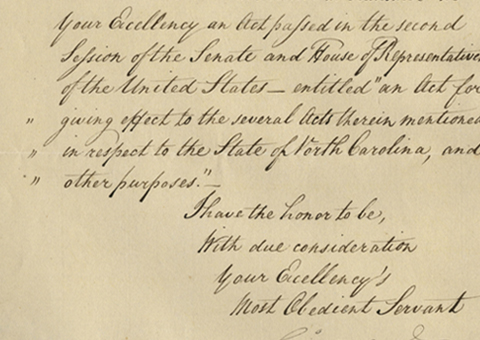The Continental Congress and Its President John Jay Repay France’s Secret Agent for the Armaments and Supplies France Clandestinely Provided During Early Years of the Revolution

A document addressed to Benjamin Franklin.
Pierre Augustin Beaumarchais, a well known dramatist, spied for the French in England in the mid-1770s. On his return, he urged the French government to support the American rebellion, taking the position that France might thus undermine Britain's growing power by helping the colonists break their affiliation to the island empire. Louis...
Pierre Augustin Beaumarchais, a well known dramatist, spied for the French in England in the mid-1770s. On his return, he urged the French government to support the American rebellion, taking the position that France might thus undermine Britain's growing power by helping the colonists break their affiliation to the island empire. Louis XVI agreed reluctantly to do so, but covertly, as success was not guaranteed and exposure might lead to a conflict with the British (which he wished to avoid).
In France, Benjamin Franklin acted as diplomat charged with convincing France to ally itself with the US, and with obtaining monies to fund the Revolution. He was purchasing agent to acquire ships and war supplies to be sent home, head recruiter seeking experienced or promising officers for the Continental Army, loan negotiator to obtain monies for the virtually bankrupt Congress, and intelligence strategist handling information in the chess game between the American, French, British and Spanish governments. He also disbursed funds for the American acquisitions effort, and generally acted as the main representative of the new United States in Europe.
France was officially neutral in the conflict between the the British and Americans during the first two years of the Revolution, before the alliance of 1778 that followed the victory at Saratoga. To preserve the appearance of this neutrality, the French Government used Beaumarchais as its secret conduit for sending arms and supplies to the Americans, loaning Beaumarchais and his new company, Roderigue Hortalez & Cie., one million livres in 1776. That firm used the money to buy military supplies from the French government, then re-sell those supplies to the Americans. It funneled cannons and enough guns and supplies for 25,000 men. "Nine tenths of the military supplies that made the victory at Saratoga possible," wrote historian Van Tyne, "came from France or through foreign merchants she secretly encouraged." All the while Beaumarchais's other career as a playwright flourished, and saw the production of his Barber of Seville (1775) and The Marriage of Figaro (1778).
By 1778 Beaumarchais’ firm had accrued so much debt making these acquisitions that it was in desperate financial condition. Meanwhile, the French government was unwilling to acknowledge its support for Beaumarchais before its official entry into the war.
Beaumarchais’ agent, Mr. de Francy, arrived in Paris to plead his case, bringing with him invoices for supplies delivered to the American cause. He wrote to Congress on May 24, 1779, “Mr. Beaumarchais’s claims against Congress amount to about 200,000 pounds sterling… I would propose to have bills drawn by Congress upon the plenipotentiary minister of the United States of Paris, to the order of Mr. Beaumarchais…” The Congressional Journal of June 5, 1779 shows that Congress recommended that while the final amount due was to be determined, “In the meanwhile, the committee on the Treasury be directed to prepare proper bills of exchange on the Minister Plenipotentiary at the Court of France [Benjamin Franklin], payable to Mr. Beaumarchais’s order at the end of three years from the date.” These bills would have different sums, from 1000 to 4000 pounds sterling or their corresponding value in livres tournois. An act was passed that day to this effect.
On the 18th of June, 1779, Congress finalized this arrangement, preparing such bills, all dated the 15th of June, which were to be entered into record and then handed to Francey to be given to Beaumarchais. This is one of those documents handed to Beaumarchais in payment for his support for the American cause.
Document signed, Jun 15, 1779, “In Congress, Philadelphia,” addressed to “The Hon. Benjamin Franklin.” “Pursuant to a Resolution of Congress, passed the fifth day of June, 1779, pay to Mr. Caron de Beaumarchais, or Order, on the fifteenth day of June, 1782, this Fourth Exchange for the Sum of 30,000 Livres Tournois, the First, Second, Third, Fifth, and Sixth of the same tenor and date, not paid, for value received by the United States. Signed by Order of Congress.” This document is signed by John Jay, President of Congress, Charles Thomson, Secretary of Congress, and John Gibson, Auditor General.
We have found record of only one of these documents having reached the market in at least the past 40 years.

Frame, Display, Preserve
Each frame is custom constructed, using only proper museum archival materials. This includes:The finest frames, tailored to match the document you have chosen. These can period style, antiqued, gilded, wood, etc. Fabric mats, including silk and satin, as well as museum mat board with hand painted bevels. Attachment of the document to the matting to ensure its protection. This "hinging" is done according to archival standards. Protective "glass," or Tru Vue Optium Acrylic glazing, which is shatter resistant, 99% UV protective, and anti-reflective. You benefit from our decades of experience in designing and creating beautiful, compelling, and protective framed historical documents.
Learn more about our Framing Services








































































































